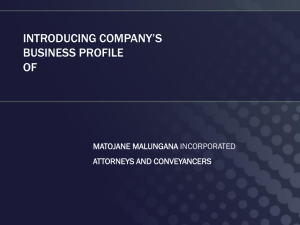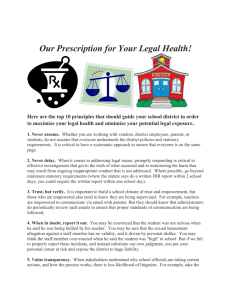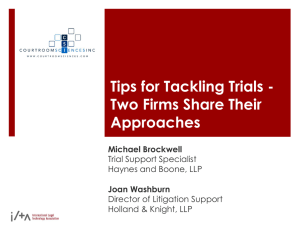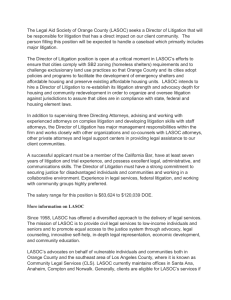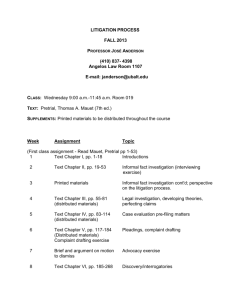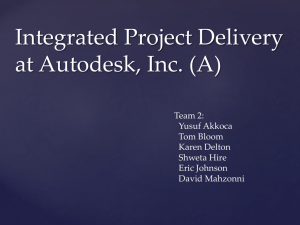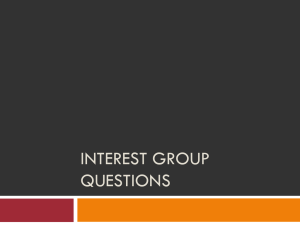Intellectual Property Regulation Board
advertisement
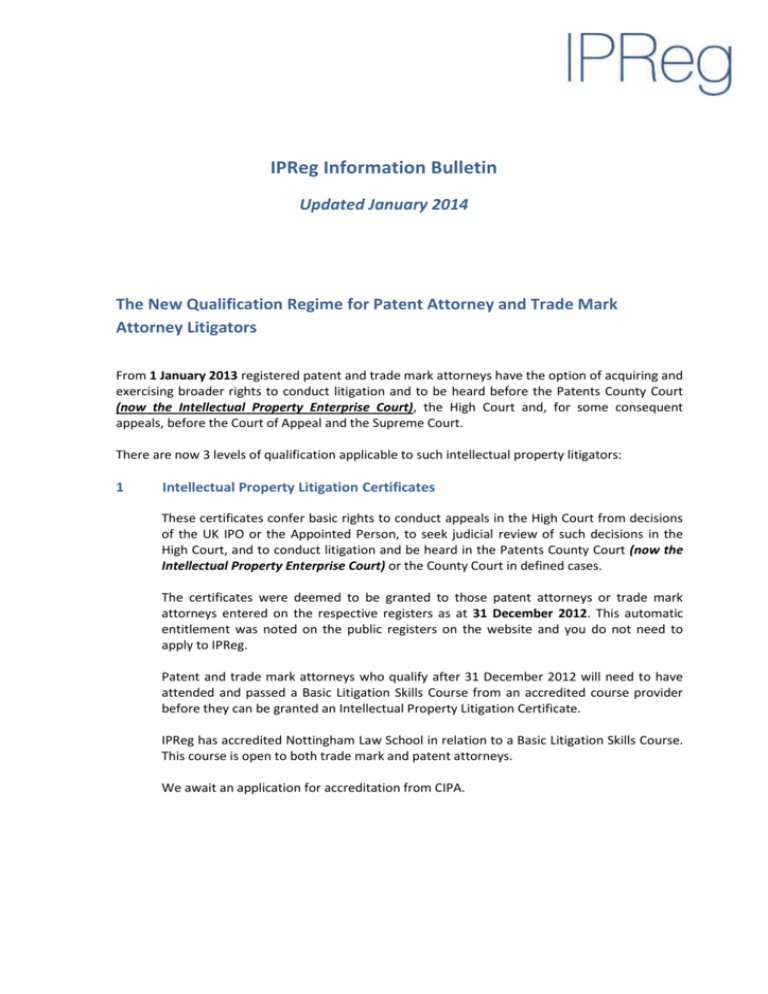
IPReg Information Bulletin Updated January 2014 The New Qualification Regime for Patent Attorney and Trade Mark Attorney Litigators From 1 January 2013 registered patent and trade mark attorneys have the option of acquiring and exercising broader rights to conduct litigation and to be heard before the Patents County Court (now the Intellectual Property Enterprise Court), the High Court and, for some consequent appeals, before the Court of Appeal and the Supreme Court. There are now 3 levels of qualification applicable to such intellectual property litigators: 1 Intellectual Property Litigation Certificates These certificates confer basic rights to conduct appeals in the High Court from decisions of the UK IPO or the Appointed Person, to seek judicial review of such decisions in the High Court, and to conduct litigation and be heard in the Patents County Court (now the Intellectual Property Enterprise Court) or the County Court in defined cases. The certificates were deemed to be granted to those patent attorneys or trade mark attorneys entered on the respective registers as at 31 December 2012. This automatic entitlement was noted on the public registers on the website and you do not need to apply to IPReg. Patent and trade mark attorneys who qualify after 31 December 2012 will need to have attended and passed a Basic Litigation Skills Course from an accredited course provider before they can be granted an Intellectual Property Litigation Certificate. IPReg has accredited Nottingham Law School in relation to a Basic Litigation Skills Course. This course is open to both trade mark and patent attorneys. We await an application for accreditation from CIPA. If you are newly qualified you are exempt from CPD in the year of qualification. However IPReg does expect every attorney to have attended and passed a basic litigation course within 3 years of qualification and the first year might be a good time to get this additional qualification “under your belt”. 2 Higher Courts Litigation Certificates These certificates confer broader litigation rights compared to those listed above, including extensive rights of audience in the Patents County Court (now the Intellectual Property Enterprise Court), and rights to conduct some litigation and appeals in the High Court, Court of Appeal and Supreme Court. Existing holders of the Patent Attorney Litigation certificates and Trade Mark Advocate certificates were passported across to the corresponding IPReg qualification when the new regime took effect. Again this was noted on the public registers although IPReg can provide a letter addressed to the court if necessary. Other applicants will now have to show that they have successfully completed an Advanced Litigation Skills Course from an approved provider which, at present, is the approved litigation course run by Nottingham Law School. 3 Higher Courts Advocacy Certificates These certificates confer full rights of audience in the High Court, Court of Appeal and the Supreme Court in any proceedings which may be conducted by an attorney holding a Higher Courts Litigation Certificate. Passporting arrangements, as above, were put in place. It is necessary to complete an approved Advocacy Skills Course or Advocacy Assessment before such a certificate is granted. A course can be accredited by IPReg (in the regulations this is an “Approved Advocacy Skills Course”). Alternatively attorrneys can apply to IPReg after successfully passing a corresponding course accredited by another Legal Regulator (in the regulations this is an “Advocacy Assessment”). Continuing Professional Development All attorneys are required to undertake 16 hours CPD relevant to their practice on an annual basis and all attorneys including attorneys “passported in” at the start of the new regime who use or intend to use their rights will be expected to undertake such CPD as is required to maintain their skills relevant to the certificates they hold. The requirement to undertake additional hours CPD in relation to litigation has been removed. Attorneys awarded Higher Courts Advocacy certificates are required to undertake five hours CPD related to high court advocacy in each of the first five full CPD years (1 January to 31 December) following the year in which the certificate was issued. Renewal All certificates are automatically renewed as part of your general renewal of registration with IPReg. There is no separate process. January 2014 NOTES The guidance has been amended to refer to the Intellectual Property Enterprise Court Courses that are already accredited for the litigation and advocacy qualifications under the CIPA Higher Courts Qualification Regulations 2007 and the ITMA Trade Mark Litigation and Trade Mark Advocacy Certificate Regulations 2009 will, until further notice, be deemed accredited for the corresponding qualification under the new IPReg Regulations. IPReg has already issued Special Rules of Professional Conduct applicable to Regulated Persons conducting litigation or exercising a right of audience before the Courts and these are available on their website at www.ipreg.org.uk. The Guidance to the main Code of Conduct has also been updated. A copy of the Rights to Conduct Litigation and Rights of Audience and other Reserved Legal Activities Certification Rules 2012 with a full description of the new regime is also available on the IPReg website. IPReg has also issued an amended version of the previous Guidance Notes on compliance with CPD Regulations 2010 to reflect the changes described above. Again this is available on the IPReg website.
